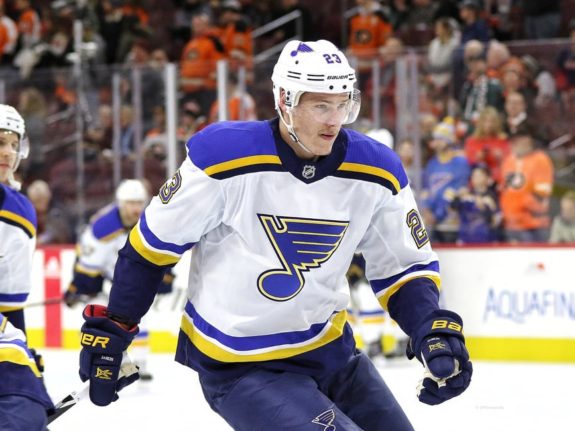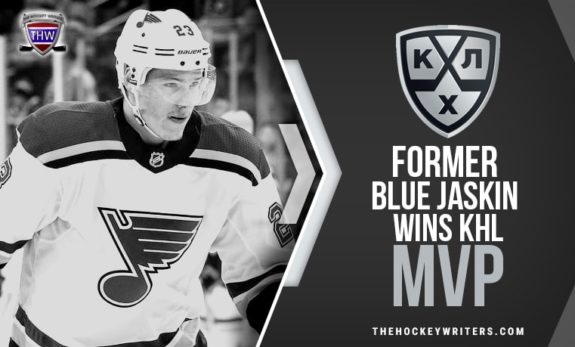The St. Louis Blues have had a lot of success in recent years, culminating in their 2019 Stanley Cup Championship. But they have also had a decade of drafting success orchestrated by their general manager, Doug Armstrong. The midmarket team has been able to build a sustained contender through successful scouting, drafting, and development over the years since Armstrong took control of the front office.
But they have had some apparent misses. Of course, every team has their complete draft misses, but the Blues have also failed to develop a handful of players into their full potential. No example of that is clearer than 2011 second-round draftee Dmitrij Jaškin, who just won the Kontinental Hockey League’s Most Valuable Player trophy, the Golden Stick. But how did he arrive at that honor after slipping through the Blues’ fingers? Let’s rewind the clock on the power forward’s career.
Jaskin’s Promising Prospects
When the Blues drafted Jaškin with the 41st pick in 2011, they foresaw great things for the Russian/Czech Republican national. Playing at various levels in the Czech League, he struggled to find consistent playing time but excelled at the international level. The season after the Blues drafted him, Jaškin migrated to North America, playing for the Moncton Wildcats of the QMJHL. There, he showed the skills Armstrong’s scouts saw in him, posting 99 points with 46 goals in just 51 games.

That performance was enough for the Blues to bring him to the NHL, which they did after his QMJHL season finished. He played just two games but got his skates wet at the highest level. The following three seasons, he split time between the Blues and their American Hockey League (AHL) affiliate at the time, the Chicago Wolves.
Jaškin played well at the AHL level but struggled to truly establish himself in the highest league, with his best performance being the 18 points he recorded in 54 games during the 2014-15 season, his third as a pro. Even with the performance, he struggled to gain confidence, as he didn’t always have the faith of then-head coach Ken Hitchcock.
Blues Move On
Because of the start-and-stop nature of his development, Jaškin eventually devolved from one of the Blues’ top prospects to a perpetual member of the bottom six. In what would become his final season in St. Louis, he did play in 76 games, his career-high, but logged only 17 points, averaging just 12:24 per game.
Even so, it was a surprise when the Blues waived Jaškin at the start of the 2018-19 season to make room for young prospects Jordan Kyrou and Robert Thomas. The Washington Capitals claimed him, adding him to a roster that had won the Stanley Cup at the conclusion of the previous season. If he was ever going to prove his worth at the NHL level, it had to be now.
Unfortunately though perhaps unsurprisingly, the Capitals’ roster proved as difficult to crack as the Blues’ roster had been. Jaškin got into just 37 games and recorded just eight points, playing his (at present) final NHL game on Apr. 6, 2019. Though we don’t know whether he fielded any NHL offers or not, Jaškin opted to continue his hockey career in his native Russia, signing a one-year contract with Dynamo Moscow, a powerhouse KHL club. It turned out to be the best decision of his career.
Jaškin Shines in KHL
Joining Dynamo Moscow was a successful move for Jaškin, who joined forces with another Russian national who knew the sting of NHL struggles: Vadim Shipachyov. Shipachyov was the second player ever to sign with the Vegas Golden Knights when they expanded into the league in 2017, but he struggled to find his grove in North America. Vegas chose to assign him to the AHL, and when he refused to report, he was suspended, and his contract was eventually terminated.
Perhaps the two bonded over their NHL history, perhaps they were just the right combination of on-ice elements, but whatever the case, they found immediate chemistry and led the team in points. Shipachyov scored 17 goals and 48 assists for 65 points in 61 games, and Jaškin had a season reminiscent of his days in Moncton, registering 31 goals and 32 assists in just 58 games. Despite Shipachyov having the edge in points, it was Jaškin who earned the honors as KHL MVP after the COVID-19 pandemic canceled the end of the league’s season.
With a KHL MVP award now in his trophy cabinet, Jaškin has certainly delivered on the promise he once showed, though not yet in the world’s toughest league. But his 2019-20 season creates two clear questions for Blues fans and NHL fans.
Was Armstrong Wrong?
The easiest question for Blues fans to answer in light of Jaškin’s development is simply: was Armstrong wrong to let him go? The answer is probably no. While he certainly showed what he’s capable of in the KHL this season, he still has not succeeded at the highest level of world hockey.
The Blues went on to win their first-ever Stanley Cup in 2019, and Thomas, who might not have had a roster spot had Jaškin remained with the team, was a major reason why. Jaškin needed a fresh start, and Armstrong gave it to him. And clearly, he didn’t immediately find traction with the Capitals, either. But will he get another chance at NHL success?
Is an NHL Return in Jaškin’s Future
As the reigning KHL MVP, there would certainly be interest from NHL clubs for Jaškin to return. And unlike players like Shipachyov, he has proved to have NHL longevity in the past, if not top-level success, so there are few concerns about whether he will stay with his team. But such a return might not be the best decision for him.

As a pending free agent, Jaškin will obviously have plenty of offers from KHL clubs as well. It’s possible his game works better on European ice, or simply that he is more comfortable in his native country. He may want to stay where he is, at least for another season.
In 2021-22, the NHL Seattle franchise will join the league, and they could pursue Jaškin like the Golden Knights once pursued Shipachyov. It may behoove him to play at least one more season in the KHL, and prove that he really has transformed as a player. Whatever his decision, the cards are all in Jaškin’s hands, and that is a positive development in his career.